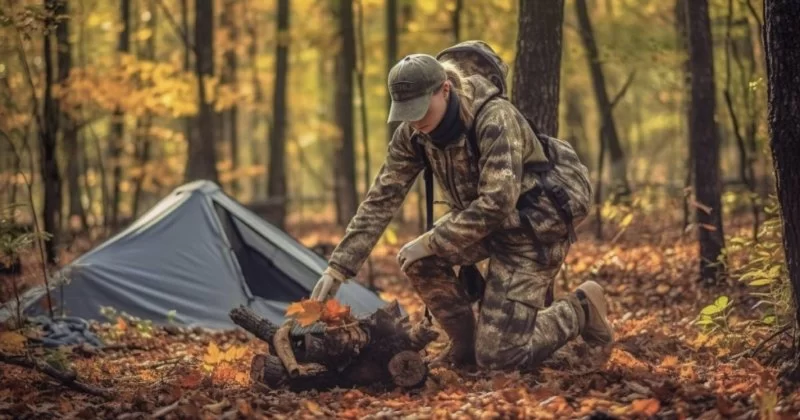Learn about responsible hunting and camping practices, key regulations, safety protocols, and ethical outdoor behavior. Discover how to enjoy nature while preserving it for future generations.

- importance-of-responsible-hunting-and-camping - The Importance of Responsible Hunting and Camping Practices
- understanding-hunting-laws-regulations - Understanding Hunting Laws and Regional Regulations
- camping-ethics-and-environmental-respect - Camping Ethics and Respect for the Environment
- safe-firearm-handling-and-wildlife-awareness - Safe Firearm Handling and Wildlife Awareness in the Field
- case-study-unethical-practice-and-its-consequences - A Real Case: When Irresponsibility Went Too Far
- balancing-tradition-with-modern-responsibility - Balancing Outdoor Traditions with Modern Responsibility
- resources-to-support-responsible-outdoor-living - Resources That Support Responsible Outdoor Living
1. The Importance of Responsible Hunting and Camping Practices
Hunting and camping are more than just outdoor activities—they are time-honored traditions deeply rooted in America's heritage. But with that privilege comes responsibility. Whether you're deep in the woods tracking deer or pitching a tent under the stars, your actions impact ecosystems, public perception, and future generations of outdoor lovers.
Responsible practices ensure that natural habitats remain undisturbed, wildlife populations stay balanced, and recreational areas remain open and safe. At Pine Cliff Resort, we’ve seen firsthand how conscientious campers and hunters enhance the experience for everyone.
2. Understanding Hunting Laws and Regional Regulations
Every state in the U.S. has its own hunting regulations. These rules are not arbitrary—they are data-driven policies designed to manage wildlife populations and ensure sustainable ecosystems. Before heading out, familiarize yourself with:
2.1 Licensing and Tags
Always obtain the proper hunting license for your state and the specific game you intend to hunt. Tags for big game species like elk or moose may require draws or lotteries due to population limits.
2.2 Legal Weapons and Seasons
Check what weapons are allowed—archery-only, muzzleloader, or rifle—and note the hunting seasons for each species. Some areas restrict hunting to preserve mating seasons or migration patterns.
Ignorance is never an excuse. Violating regulations can lead to fines, weapon confiscation, or permanent loss of hunting privileges.
3. Camping Ethics and Respect for the Environment
Whether primitive camping or staying in developed sites, responsible camping means minimizing your impact. The "Leave No Trace" principle should guide every action—from where you pitch your tent to how you dispose of waste.
3.1 Waste Management and Campfire Safety
Never leave trash, even biodegradable items like orange peels. Use bear-proof containers when needed. If building a fire, ensure it’s permitted, keep it small, and completely extinguish it before leaving.
3.2 Respecting Wildlife and Quiet Hours
Feeding animals—even accidentally—can alter their natural behavior and put them and others at risk. Likewise, playing loud music or using bright lights at night can disturb both animals and fellow campers.
4. Safe Firearm Handling and Wildlife Awareness in the Field
Safe firearm use is at the heart of ethical hunting. This includes how you store, carry, aim, and discharge your weapon—not just for your own safety but for others and wildlife.
4.1 Key Rules of Firearm Safety
Always treat your firearm as if it’s loaded. Keep your finger off the trigger until ready to shoot. Be sure of your target and what lies beyond it. These basic rules can prevent tragedies.
4.2 Identifying Targets and Preventing Mistaken Kills
Every hunter should take the time to positively identify their game—especially during overlapping seasons. A quick decision can lead to illegal kills or harming non-target species.
5. A Real Case: When Irresponsibility Went Too Far
In 2022, a group of hunters in Colorado ignored signage and shot multiple elk in a protected zone. Not only were their licenses revoked, but the event led to local community backlash and stricter hunting rules.
The incident sparked debate on social media, with some defending the hunters’ “honest mistake,” while others emphasized that accountability matters. In reality, all of this could have been avoided with a $10 map and 5 extra minutes of planning.
At Pine Cliff Resort, we encourage all guests to review maps, regulations, and safety protocols before heading out—because mistakes in the field can echo far beyond the forest.
6. Balancing Outdoor Traditions with Modern Responsibility
Today's outdoor enthusiasts must merge tradition with innovation. Trail cams, GPS, and drone tech are changing how we scout and hunt. But they also raise new ethical questions: Is using a drone to find elk really fair chase?
6.1 Technology with Purpose
When used wisely, modern tools enhance safety and success. But it’s essential to use them within ethical and legal boundaries. Staying informed helps you enjoy the benefits of technology without overstepping nature’s balance.
7. Resources That Support Responsible Outdoor Living
You don’t have to figure everything out alone. State wildlife agencies, conservation nonprofits, and platforms like Pine Cliff Resort offer guides, gear, and workshops to help you camp and hunt with care.
7.1 Continuing Education and Community
Look for local hunter education classes or environmental stewardship groups. Sharing stories and learning from seasoned outdoorspeople can elevate your experience—and your impact.
Being a respectful hunter or camper isn’t about rules—it’s about mindset. When we care for nature, it returns the favor tenfold.
Lane Bay Chickee
Florida, USA
Visit Location PageTerrora Campground
Jane Hurt Yarn Rd, Tallulah Falls, GA 30573, USA
Visit Location Page